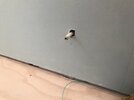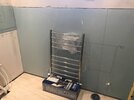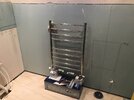- Joined
- 29 Jun 2021
- Messages
- 125
- Reaction score
- 5
- Country

I have removed a rad from the bathroom that was fed from 10mm plastic pipe (see attached pic), which had been chased into the wall; I dread to think how deep they went! I now need to move the pipes higher up the wall for the replacement towel rail and my query relates to the best way to do this? I'm really looking for the method that involves the minimum amount (depth) of channelling?
If I were to use 15mm copper and elbow, or 10mm Speedfit with coldform elbow, I would probably need to go deeper than the recommended 30% through the Thermalite block i.e. something around 40mm!?
My current best guess is to use 10mm microbore and where it comes out from the wall, use a 10-15mm elbow and have a piece of 15mm copper to insert into the valve. I could then use a stainless steel / chrome shroud to hide the copper!?
I've got access to the floor currently and so there are no restrictions in that regard.
What do you folks recommend?
TIA
If I were to use 15mm copper and elbow, or 10mm Speedfit with coldform elbow, I would probably need to go deeper than the recommended 30% through the Thermalite block i.e. something around 40mm!?
My current best guess is to use 10mm microbore and where it comes out from the wall, use a 10-15mm elbow and have a piece of 15mm copper to insert into the valve. I could then use a stainless steel / chrome shroud to hide the copper!?
I've got access to the floor currently and so there are no restrictions in that regard.
What do you folks recommend?
TIA



